Climate Crisis Is a Health Crisis: FKM Unhas Holds International Guest Lecture, Strengthening Global Research Networks with the University of Amsterdam
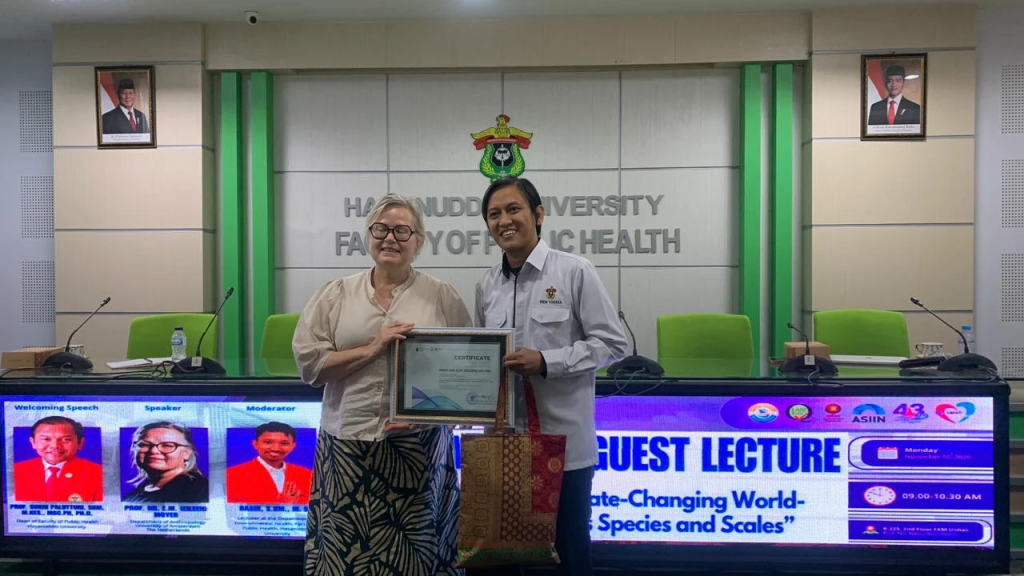
MAKASSAR – [Date of Publication on Faculty Website] – Amid global challenges such as extreme temperature increases, diminishing air quality, and ecosystem destabilization, the Faculty of Public Health (FKM) at Hasanuddin University (Unhas) steps up to assume a crucial role. In commemoration of its 43rd Dies Natalis (Anniversary), FKM Unhas successfully organized an International Guest Lecture focusing on the most pressing issue of this century: public health in a world grappling with the climate crisis. This prestigious scientific event carried the provocative theme, “Public Health in a Climate-Changing World: Rethinking Risk Across Species and Scales,” and featured a prominent expert in health anthropology from Europe, Prof. dr. E.M. (Eileen) Moyer from the Department of Anthropology, University of Amsterdam, The Netherlands. This cross-continental forum transcended mere knowledge transfer, transforming into a stage for strategic dialogue that demands the academic community re-examine the foundations of public health within the context of fragile and interconnected ecosystems. Affirming Commitment to Scientific Collaboration Amidst a Global Emergency The event was officially and enthusiastically opened by the faculty leadership. Prof. Dr. Atjo Wahyu, S.KM., M.Kes., along with Prof. Anwar Mallongi, S.KM., M.Sc.PH., Ph.D., affirmed that the health paradigm has now shifted and can no longer be viewed in isolation from environmental conditions. “The climate crisis is a health crisis. We can no longer focus solely on individuals. This complex global challenge demands interdisciplinary and international collaboration to understand and resolve the issues,” asserted Prof. Atjo Wahyu, whose remarks were warmly received by the attendees, including lecturers, postgraduate students, and researchers. Strengthening international networking was one of the main focuses of this year’s Dies Natalis event. Dr. Dian Sidik Arsyad, S.KM., M.KM., Ph.D., Head of the Department of Epidemiology at FKM Unhas and an alumnus of a Dutch university, emphasized the importance of such initiatives. “This academic forum is a golden moment to strengthen the scientific network between Unhas, as a representative of the Global South, and leading universities in Europe,” said Dr. Dian. “Impactful global research begins with equal cross-cultural dialogue. FKM Unhas is strategically positioned and ready to be a knowledge bridge connecting the South and the North in addressing the challenges to planetary health.” The presence of Prof. Moyer from the University of Amsterdam, one of the world’s best research institutions, is tangible proof of FKM Unhas’s commitment to always being at the forefront of the global health discourse and facilitating the exchange of best ideas for the academic community in Eastern Indonesia. Reading Climate Symptoms: Anthropology and the Diagnosis of Planetary Health The core session of the Guest Lecture was interactive, lasting 90 minutes and moderated by Basir, S.KM., M.Sc. from the Department of Environmental Health. Prof. Moyer presented a deep anthropological perspective on the correlation between Climate Change, disease patterns, and human behavioral adaptation. According to her, the climate crisis is not merely a natural disaster or a technical environmental problem, but a “social disease” that starkly reveals how dominant economic systems, cultural structures, and natural ecology overlap and influence one another. “To rethink public health in a climate-changing world means to recognize that human wellbeing is deeply intertwined with the health of ecosystems and other species,” explained Prof. Moyer. She urged that rethinking public health means acknowledging that human welfare is intricately linked to the health of ecosystems and other species. Through a multi-species approach, Prof. Moyer invited participants to broaden their scope of understanding: health should no longer be solely measured by the status of the human body, but must be understood from the entire web of life—encompassing the quality of the water we drink, the air we breathe, the fertility of the soil, and the condition of other living beings that share our space on Earth. This perspective is highly relevant in the context of Indonesia, which is rich in biodiversity yet vulnerable to the impacts of the climate crisis. From the Campus Laboratory to Community Reality: Addressing Local Threats The dialogue and Q&A session became highly dynamic as FKM Unhas lecturers and students shared empirical findings and direct field observations. Indonesia, particularly South Sulawesi, is highly vulnerable to environmentally-based diseases triggered by climate change, such as: An equally critical environmental issue raised by the participants was plastic waste. It was highlighted that microplastic contamination has now become a hidden health threat, polluting drinking water, the air we breathe, and even the seafood food chain. The participants, comprising academics from the Departments of Environmental Health, Epidemiology, and Health Policy Administration, called for three strategic actions: Revisiting the Vision of Science and Academic Leadership Concluding the session, the Dean of FKM Unhas, Prof. Sukri Palutturi, S.KM., M.Kes., MSc.PH., Ph.D., provided an affirmation that serves as a moral reflection on the role of the university. “This international guest lecture is not merely a routine transfer of knowledge. It is a moral and ethical reflection of the university on global humanitarian issues,” said Prof. Sukri. “Public health is not just a laboratory matter; it is a matter of the Earth and our collective conscience. We need to shift our perspective and begin to see health as a form of ecological justice.” The conclusion of this forum was unanimous: the future of public health highly depends on humanity’s ability to build ecological solidarity—a fundamental awareness that the survival of human civilization cannot be separated from the maintenance of nature’s balance. Through the successful organization of this International Guest Lecture, FKM Unhas once again asserts its position as a strategic and relevant center for public health thought in the Southeast Asian region. This academic forum has not only successfully expanded scientific and research networks but has also enriched the collective awareness that science, ethics, and the environment must unite in one single vision: Protecting Life. From the campus located in Eastern Indonesia, FKM Unhas has sent a scientific echo resonating as far as Amsterdam and the global academic community, bringing a new perspective on planetary health: the health of humanity relies on the health of the Earth.
FKM Unhas Introduces Nature-Based Clean Water Innovation in Barru

As part of its commitment to the Tri Dharma of Higher Education, particularly community service, the Research and Community Service Institute (LPPM) of Universitas Hasanuddin, in collaboration with the Faculty of Public Health’s Coastal Domestic Water Research Group (CDWRG), conducted a community engagement program in Cilellang Village, Mallusetasi District, Barru Regency, on Wednesday, July 23, 2025. The program, themed “Application of Clean Water Treatment through Natural Coagulation-Filtration Processes,” was led by Dr. Agus Bintara Birawida, S.Kel., M.Kes., along with team members Prof. Anwar Daud, SKM., M.Kes., and Dr. Sri Handayani, S.Km., M.Kes. All three are permanent lecturers at the Faculty of Public Health, Universitas Hasanuddin, with extensive expertise in environmental health, particularly in clean water management, sanitation, and community-based health promotion. Cilellang Village was selected based on the community’s urgent need for access to safe drinking water. The available water sources in the area are generally turbid, discolored, and have an unpleasant odor, highlighting the need for an immediate and sustainable water treatment solution. The activity began with educational sessions on the importance of clean water and its impact on public health, followed by a hands-on demonstration of a simple, nature-based water treatment system. The introduced method used Moringa oleifera seeds as a natural coagulant to bind impurities, followed by filtration through layers of activated carbon, pumice stone, and silica sand—significantly improving the water’s clarity and quality. At the end of the session, the water treatment unit was handed over to the community and village representatives, symbolizing support for local water management autonomy. This initiative not only provided a practical solution for clean water access but also aligned with national development goals and contributed directly to the Sustainable Development Goals (SDGs), especially SDG 6: Clean Water and Sanitation. By introducing a low-cost, easy-to-operate technology that utilizes locally available materials, LPPM Unhas and CDWRG are supporting key SDG 6 targets—improving safe water access, reducing water pollution, and enhancing community capacity for independent water management. It also serves as a preventive measure to reduce the risk of waterborne diseases and to build resilience against future water crises. More than just a technology transfer, this program reflects a concrete effort to address real community needs through scientific, collaborative, and culturally rooted approaches. Universitas Hasanuddin and CDWRG remain committed to empowering communities and fostering healthy, sustainable environments through ongoing engagement and innovation.
FKM Unhas Deploys Students for Field Practice (PBL 1) in Soppeng Regency: A Strong Commitment to Community Engagement

Makassar, July 10, 2025 – The Faculty of Public Health at Universitas Hasanuddin (FKM Unhas) once again demonstrates its commitment to educating students who are ready to serve the community. Held at the FKM Unhas campus, a send-off ceremony was conducted for students participating in the Field-Based Learning (PBL) 1 program, which will take place in Soppeng Regency from July 14 to 28, 2025. This program involves students from the 2023 cohort who are currently in their fourth semester. A total of 36 villages and urban communities across eight subdistricts—Marioriwawo, Liliriaja, Lilirilau, Lalabata, Donri-Donri, Marioriawa, Ganra, and Citta—will serve as fieldwork locations. To ensure academic guidance, 36 lecturers from various departments within FKM Unhas will participate as supervisors, directly mentoring students throughout their fieldwork activities. The PBL 1 Committee Chair, Mr. Dian Saputra Marzuki, S.KM., M.Kes., who also serves as a lecturer in the Department of Health Administration and Policy, explained that this activity is an essential part of the academic curriculum. It is designed to train students to identify public health problems in real-world settings and to systematically determine appropriate priorities for intervention. “PBL 1 serves as a crucial bridge between classroom theories and field realities. Students not only learn how to identify health issues, but also how to engage ethically and professionally with the community,” he stated. During the briefing session, students were encouraged and reminded to uphold ethical conduct, integrity, and professionalism during their field assignments. The Dean of FKM Unhas emphasized that this activity is part of the institution’s continuous efforts to produce high-quality graduates who are socially responsive and capable of making meaningful contributions to society. The PBL 1 program also reflects FKM Unhas’ support for Sustainable Development Goal (SDG) 3: “Ensure healthy lives and promote well-being for all at all ages.” By strengthening student capacities in understanding and addressing public health issues, FKM Unhas actively contributes to achieving global development goals. With a spirit of dedication, FKM Unhas deploys its students to work directly with communities—not only as part of their academic training, but also as a tangible institutional contribution toward improving community well-being through a community-based public health approach.
Environmental Health Master’s Students from Unhas Expand Global Networks through Academic Visit to Mahidol University, Thailand
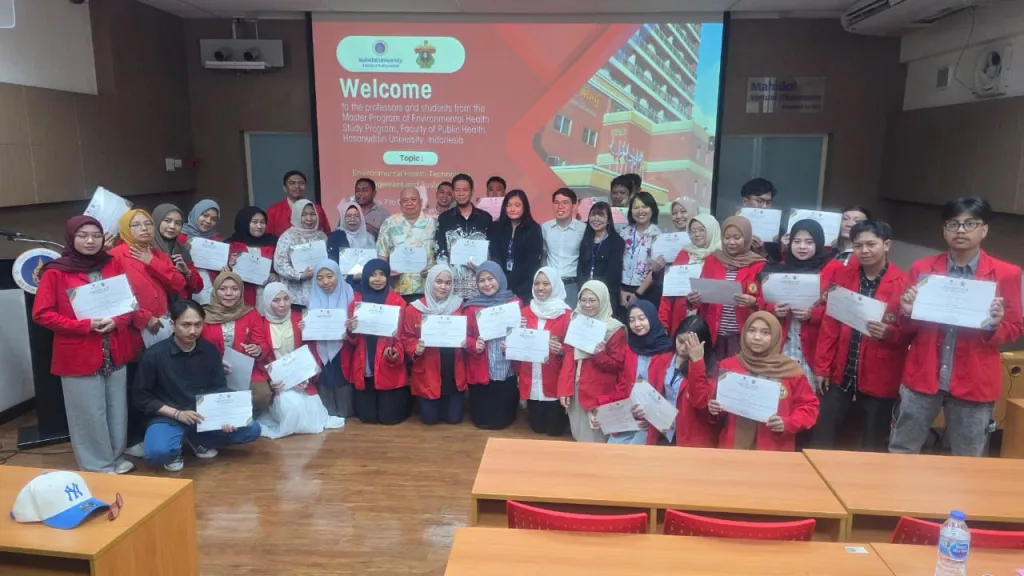
Bangkok, UNHAS.TV – As part of its commitment to academic internationalization, Universitas Hasanuddin (Unhas) has sent 31 postgraduate students from the Environmental Health program to Mahidol University, Thailand. Held from July 7 to 8, 2025, the visit included a benchmarking program and an intensive training focused on “Environmental Health Technology, Management, and Sustainability”, hosted by one of Southeast Asia’s leading public health institutions. Over the course of two full days, participants engaged in dynamic academic discussions, expert presentations, and hands-on workshops that explored innovative approaches to sustainable environmental health management. A highlight of the program was a workshop on Health Risk Assessment (HRA) led by Assoc. Prof. Suphaphat Kwonpongsagoon, Ph.D, a distinguished scholar from the Faculty of Public Health, Mahidol University. In her session, Prof. Kwonpongsagoon emphasized the critical role of data-driven innovation in addressing environmental health challenges, particularly within the Southeast Asian context. She explained how the HRA framework serves as a foundational tool for identifying, assessing, and managing health risks related to environmental factors—offering a comprehensive basis for policy and effective interventions. Laying the Groundwork for Deeper Academic Collaboration Prof. Dr. Anwar Daud, M.Kes, Head of the Environmental Health Postgraduate Program at Unhas, highlighted the relevance of this benchmarking initiative in enhancing curriculum quality and research development. He noted promising opportunities for joint research, especially in the areas of environmental monitoring technologies, sustainable management systems, and studies on chemical and microbial hazards. Prof. Anwar, who earned his doctoral degree from Mahidol University, added that the institution’s extensive experience could serve as a model for advancing Unhas’s own graduate programs. Echoing this sentiment, Prof. Dr. Sukri Palutturi, Ph.D, Dean of the Faculty of Public Health at Unhas, stated that the visit served as a valuable platform for academic exchange between the two institutions. He expressed hope that the initiative would pave the way for broader academic collaboration—ranging from student and faculty exchange, joint research projects, to collaborative scientific publications. Advancing Internationalization and SDG Commitment Renowned for its commitment to innovation and sustainability in public health education, Mahidol University provided an ideal setting for this international academic engagement. The benchmarking activity aligns with Unhas’s ongoing efforts to support its internationalization agenda and contribute to the achievement of the Sustainable Development Goals (SDGs), particularly in environmental health. This program represents a concrete step in Unhas’s mission to innovate and lead in creating healthier and more sustainable environments. The initiative, championed by Prof. Dr. Anwar Daud, SKM., M.Kes., EHS and Prof. Anwar Mallongi, SKM., MSc., Ph.D, is expected to expand further—strengthening Unhas’s role as a World-Class University committed to global collaboration and excellence.
Strengthening Global Networks: FKM Unhas Explores Postgraduate Collaboration with Mahidol University
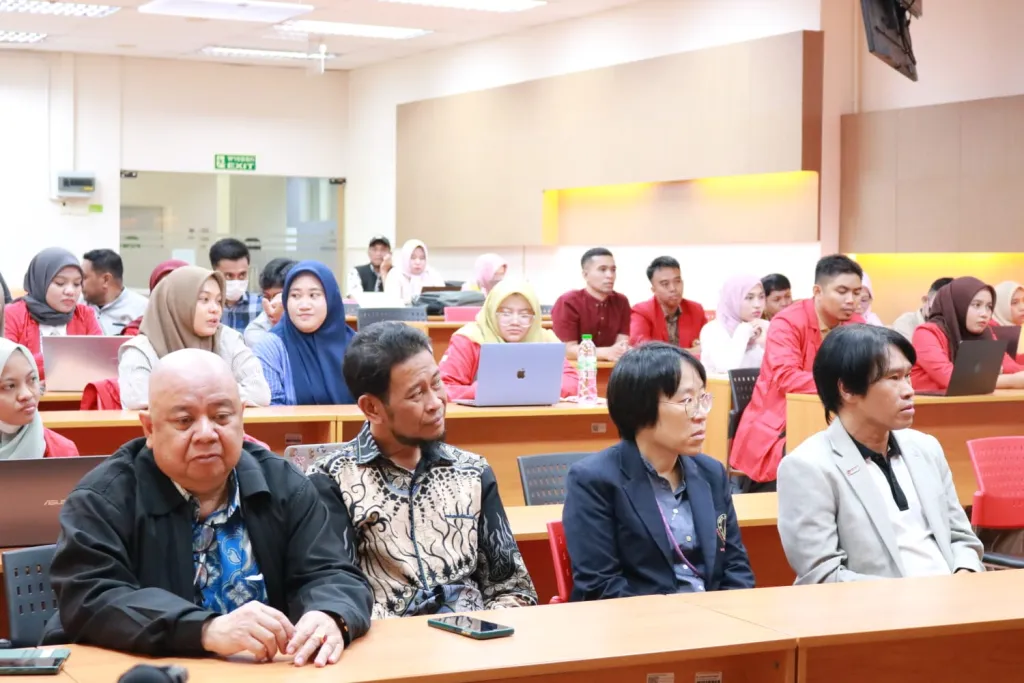
Bangkok, UNHAS.TV – In an effort to expand international academic partnerships, the Faculty of Public Health (FKM) at Universitas Hasanuddin has initiated strategic discussions with the Faculty of Public Health, Mahidol University, Thailand. This initiative marks the beginning of a potential collaboration to be formalized through a Memorandum of Agreement (MoA), particularly in the areas of postgraduate education and research in public and environmental health. The bilateral meeting took place on July 8, 2025, in Bangkok, in conjunction with the Workshop on Environmental Health Technology, Management, and Sustainability, held on July 7–8, 2025, at Mahidol University. This scientific forum served as a platform to connect scholars from various institutions and strengthen cross-border academic dialogue. FKM Unhas was represented by two key figures: Prof. Dr. Anwar Daud, SKM., M.Kes, Head of the Master of Environmental Health Program, and Prof. Anwar Mallongi, SKM., MSc., Ph.D, Vice Dean for Partnerships, Research, and Innovation. From Mahidol University, the meeting was attended by the Dean of the Faculty of Public Health, Dr. Sarawut Thepanondh. The Dean of the Faculty of Public Health, Mahidol University, Thailand, Dr. Sarawut Thepanondh, delivered a welcoming speech before the FKM Unhas delegation. Collaborative Focus: Joint Curriculum, Research, and Academic Engagement Discussions between the two institutions centered on the development of a joint curriculum, aimed at establishing equivalent and globally oriented postgraduate education standards. This collaboration also opens opportunities for student and faculty exchanges, enhancing the competencies of graduates to address international public health challenges. Research collaboration was another key focus, particularly on pressing issues such as climate change, waste management, and environmental sustainability. The partnership will enable the exchange of expertise and research resources, leading to more impactful and relevant scientific outcomes. Moreover, both institutions expressed interest in co-hosting guest lectures and international seminars, which will enrich the academic experiences of students and faculty members alike. A warm atmosphere filled the discussion at the Faculty of Public Health, Mahidol University, Bangkok. Representatives from FKM Unhas—Prof. Dr. Anwar Daud (Head of the Master’s Program in Environmental Health) and Prof. Anwar Mallongi (Vice Dean for Partnerships, Research, and Innovation)—joined Mahidol University officials, including Dr. Sarawut Thepanondh (Dean of the Faculty of Public Health), to explore potential doctoral and master’s level collaborations. Our mission: to achieve international standards in public health education and research. Toward Concrete Implementation According to Prof. Dr. Anwar Daud, the collaboration is not merely about expanding academic networks but also a concrete step toward achieving international standards in education and research. “This partnership is expected to broaden students’ perspectives and experiences within the global public health context,” he stated. The next step involves drafting a comprehensive MoA and outlining a joint work agenda to ensure effective implementation. This strategic collaboration is expected to enhance the academic capacities of both FKM Unhas and Mahidol University and contribute significantly to the development of human resources capable of addressing the complexities of global public and environmental health. This initiative serves as tangible proof that amid the ever-changing global landscape, international collaboration is essential for generating innovative and sustainable solutions. With the foundation now in place, the partnership between FKM Unhas and Mahidol University holds great promise for advancing public health knowledge and practice across the region.
FKM UNHAS Community Service Team Promotes Smoke-Free Waste Management Education in Wanio Village, Sidrap
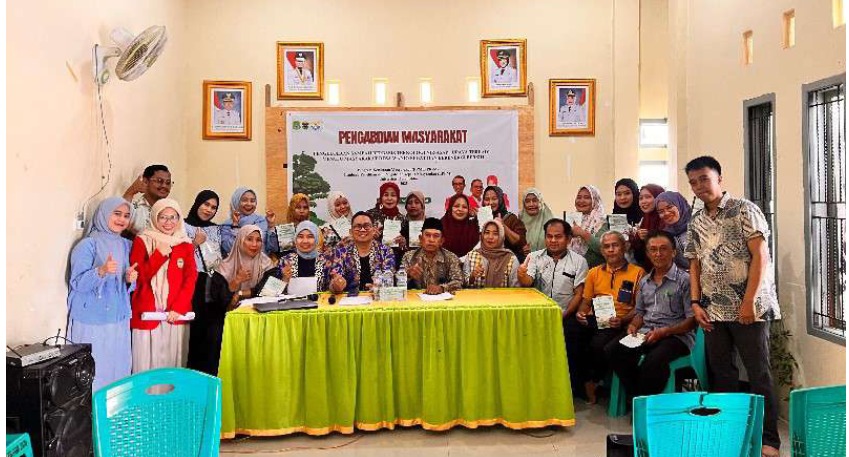
Sidrap, June 20, 2025 — As part of its ongoing commitment to environmental sustainability and community empowerment, the Community Service Team of Universitas Hasanuddin (PPMU UNHAS) conducted a public education activity entitled “Smoke-Free Waste Management Education” in Wanio Village, Panca Lautang Sub-district, Sidenreng Rappang Regency, on Friday, June 20, 2025. This activity was implemented under the Community Service Program (PPMU-PKM) funded by the Institute for Research and Community Service (LPPM) of Universitas Hasanuddin for the 2025 fiscal year. The team was led by Dr. Syamsuar Manyullei, SKM., M.Kes., MSc.PH, with team members Dr. Wahiduddin, SKM., M.Kes., and Nasrah, SKM., M.Kes. The event attracted participation from various local stakeholders, including the Village Head of Wanio, Mr. Muhammad Aziqin, representatives of the Village Consultative Body (BPD), local hamlet heads, village health cadres, and community leaders. In his opening remarks, Dr. Syamsuar emphasized the importance of fostering environmental awareness and sustainable household waste management practices. He stated that this initiative marks a starting point in cultivating an environmentally conscious culture within the community. The core content of the session included demonstrations on how to safely incinerate waste using a specialized smoke-free combustion tool, which reduces the release of hazardous emissions. In addition, participants were introduced to the potential reuse of combustion by-products—ash and condensed liquid—as organic liquid fertilizers. “Waste does not have to be a problem if managed appropriately. We are introducing a smoke-free incinerator that is safer for both the environment and public health,” Dr. Syamsuar explained during the educational session. This initiative reflects UNHAS’s commitment to advancing sustainable development goals through community-based environmental health interventions and innovations in waste management.
FKM Unhas Holds Community Service, Focuses on Anxiety Prevention for Diabetics
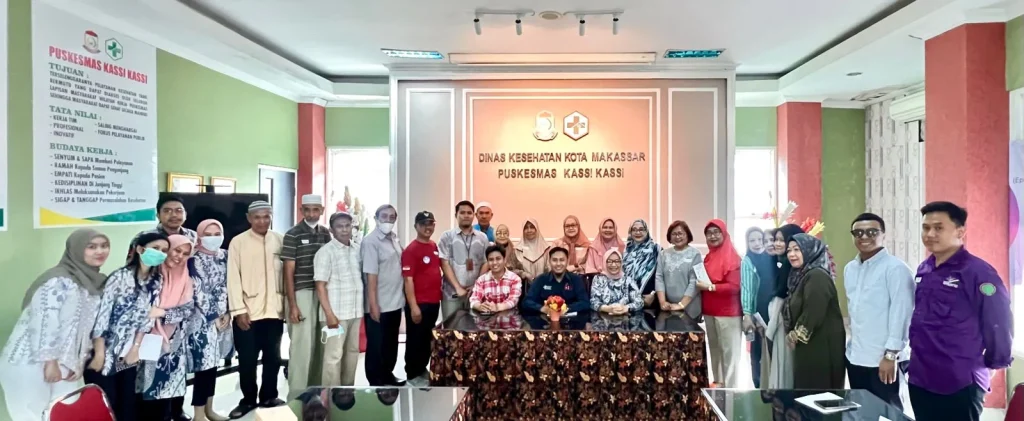
Makassar, June 14, 2025 – The Research Group Social Epidemiology of Non-Communicable Disease (TRG SE NCD) of the Faculty of Public Health (FKM) at Hasanuddin University recently conducted a community service and research activity focused on preventing anxiety in patients with Diabetes Mellitus (DM) at the Kassi-Kassi Public Health Center, Makassar. The event, held on Saturday, June 14, 2025, was directly led by the Head of TRG SE NCD FKM Unhas, Prof. Dr. Ida Leida Maria, S.KM., M.KM., M.Sc.PH, and involved a number of academics, researchers, and students from various academic levels. Prof. Ida Leida Maria highlighted the significant increase in the number of people suffering from degenerative diseases like Diabetes Mellitus in Indonesia. “Without significant prevention efforts, the morbidity, mortality, and demand for health services due to diabetes will continue to rise. Therefore, managing anxiety in DM patients is crucial,” she explained. She added that by 2030, an estimated 21.3 million people in Indonesia will suffer from diabetes, many of whom face complications that trigger anxiety. In addition to interactive education on anxiety management, the activity also provided comprehensive health screenings, including blood pressure, blood sugar levels, cholesterol, and blood sample collection for HbA1c and genetic testing. “This step is important so that the public can know their health status earlier and take preventive measures immediately,” Prof. Ida stated. The event was also attended by the Head of Administration and Head of Prolanis at Kasi-Kasi Public Health Center, Anwar Ganing, S.Kep., Ns., along with the surveillance team from Kasi-Kasi Public Health Center, Haspina Palalloi, SKM. Active participants from the community service team included Dr. Wahiduddin, S.KM., M.Kes., Dr. Ridwan Mochtar Thaha, M.Sc., Firman, S.KM., M.KM., and Rianda Ridho Hafizh Thaha, SE., MBA. As a form of ongoing support, each participant received a pocketbook guide on managing anxiety in Diabetes Mellitus patients. The event concluded with the distribution of souvenirs and a group photo session, marking FKM Unhas’s commitment to improving community well-being through a holistic approach to health.
Faculty of Public Health Unhas Strengthens 2025 Healthy Campus Program: A Tangible Contribution to the SDGs

Makassar, June 18, 2025 — The Faculty of Public Health, Universitas Hasanuddin (FPH Unhas), continues to demonstrate its strong commitment to creating a healthy and sustainable campus environment. Through its dedicated Healthy Campus Working Group (Pokja Kampus Sehat), the faculty recently held a strategic meeting to finalize preparations for the 2025 Healthy Campus Program. Held in the Prof. Nur Nasry Noor Room, 2nd Floor of the faculty building, the meeting brought together members of the Non-Communicable Disease (NCD) Post Service Team and the Healthy Campus Implementation Team. Key agenda items included the presentation of the activity plan, timeline development, role distribution, and strategies for engaging students and the wider academic community to ensure the program’s success. The Healthy Campus Program serves as a concrete implementation of FPH Unhas’ commitment to the Sustainable Development Goals (SDGs), particularly SDG 3: Good Health and Well-being. More than that, it aspires to build a truly healthy, inclusive, and productive learning ecosystem within the campus. Focus on Three SDG Pillars: Health, Education, and Environment The 2025 Healthy Campus Program is designed to contribute directly to various aspects of sustainable development, with an emphasis on: The program adopts a holistic approach, addressing not only physical health, but also environmental sustainability, mental well-being, and social inclusion in campus development. A key highlight of the meeting was the strategic role of student involvement as agents of change. Students will be empowered not only as participants but also as implementers and ambassadors of the healthy campus initiative—tasked with spreading health messages throughout the academic community and beyond. The upcoming Healthy Campus activities will include health campaigns, student health cadre training, routine health screenings, revitalization of campus public spaces, and the strengthening of NCD service units and campus-based Posbindu (Integrated Health Post). Through this meeting, the Healthy Campus Working Group reaffirmed its readiness to implement the program in a more structured, innovative, and sustainable manner. All initiatives and policies will be outcome-oriented and aimed at maximizing the well-being of the entire campus population. With strong cross-unit collaboration and full support from FPH Unhas leadership, the 2025 Healthy Campus Program is expected to become a national model for establishing higher education institutions that are holistically healthy—physically, mentally, socially, and environmentally.
FKM Unhas Steps onto the Global Stage: A Paraphrased News Report
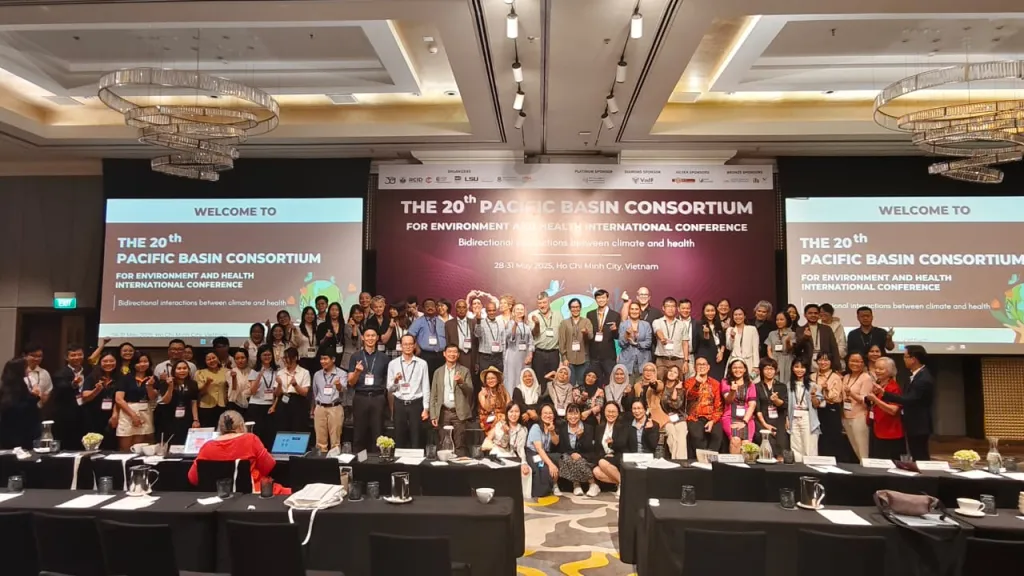
HO CHI MINH CITY, UNHAS.TV – In the vibrant city of Ho Chi Minh, a delegation of academics and students from the Faculty of Public Health (FKM) at Hasanuddin University (Unhas) marked a significant international milestone. From May 28-31, 2025, they actively participated in The 20th Pacific Basin Consortium for Environment and Health International Conference (PBC), a prestigious forum bringing together leading thinkers and practitioners in environmental and health issues. The conference, themed “Bidirectional Interactions between Climate and Health,” served as a global platform to discuss the profound connections between climate change and public health. Amidst participants from various parts of the world, the FKM Unhas delegation brought the spirit of scientific inquiry from eastern Indonesia, led by Vice Dean I, Dr. Wahiduddin, M.Kes., and Head of the S1 Study Program, Dr. Hasnawati Amqam. Dr. Hasnawati Amqam, Head of the Public Health S1 Study Program at Hasanuddin University, delivered an impressive oral presentation at the prestigious 20th Pacific Basin Consortium for Environment and Health International Conference (PBC). During the event, she presented her significant research titled “Non-Linear Associations Between Prenatal Heavy Metal Exposure and Fetal Growth.” Alongside them, several lecturers actively contributed, including Prof. Dr. dr. Syamsiar S. Russeng, MS., Dr. dr. Masyita Muis, MS., Dr. Apik Indarty Moedjiono, SKM., M.Si., Dr. Syamsuar Manyullei, SKM., M.Kes., M.Sc.PH., Andi Wahyuni, SKM., M.Kes., and Nasrah, SKM., M.Kes. They attended not merely as observers but as active contributors to global discussions, sharing insights, absorbing knowledge, and forging cross-national partnerships. A particularly proud moment was when five FKM doctoral students—Abdul Madjid, Irawati, Ana Utami Zainal, Isymiarni Syarif, and Niaria Esba Panjaitan—were honored with the opportunity to present in both oral presentation and student poster sessions. For them, this was more than just a chance to present; it was a moment to affirm that Indonesia’s young scientists from FKM Unhas are ready to engage and compete in the international academic arena. Beyond the complex topics of climate change and its health impacts, the conference offered invaluable experiences: engaging in discussions with professors from world-renowned universities, exchanging ideas with students from different continents, and building connections that could lead to future research collaborations. More than just attending a conference, this participation reflects FKM Unhas’s commitment to expanding its academic horizons and strengthening its active role in global issues. Amidst the increasingly complex challenges in public health, this university from eastern Indonesia proved itself to be part of a borderless solution. Their steps in Vietnam may be just one event among many, but the echoes of the spirit and knowledge brought home will continue to grow—in classrooms, in research, and in the hearts of students who dream bigger for a healthier world.
FKM Unhas Student, Andi Fajrul Pratama, Bags Gold in Karate at Menhan RI Cup National Championship 2025: Inspiration from the Mat to the Lecture Hall
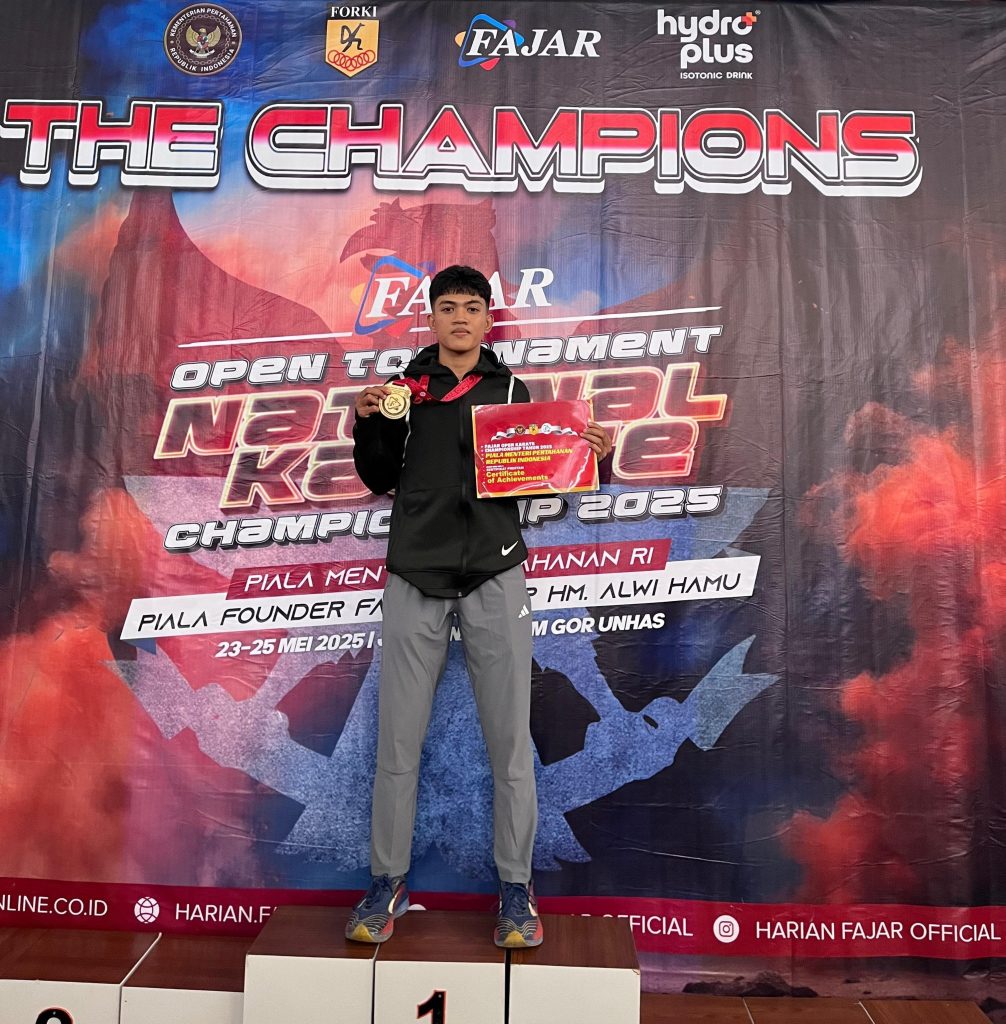
Makassar, May 26, 2025 – Cheers of pride echoed through the UNHAS Sports Hall last weekend as Andi Fajrul Pratama, a 2023 student from the Faculty of Public Health (FKM) at Hasanuddin University (Unhas), was announced as the 1st Place winner in the prestigious Minister of Defense of the Republic of Indonesia Cup National Championship 2025 for karate. This golden achievement not only brought honor to Unhas but also became an inspiring story for many. From May 23 to 25, 2025, the karate mat at the UNHAS Sports Hall bore witness to Fajrul’s struggle. Behind his tenacity lay a simple yet powerful motivation: to achieve and make his parents proud. For this, he was serious about his preparation. Intensive daily training and, not to forget, frequent prayers, became his reliable recipe. “The toughest challenge wasn’t actually the opponent on the field, but fighting laziness during practice,” Fajrul said with a smile. However, with strong determination, he managed to overcome each challenge, one by one. The three days of the National Championship weren’t just about competition. For Fajrul, it was an exciting and valuable experience. He not only honed his skills but also built relationships with athletes from various regions. “It felt like finding a new family in every match,” he remarked. This wasn’t Fajrul’s first time competing. He had previously tested his abilities in Riau, adding to his experience and competitive spirit. The greatest strength came from the “trio” of support: family, friends, and of course, his beloved campus. The encouragement they gave him became powerful fuel for him to keep fighting. Now, with the gold medal around his neck, Fajrul’s spirit in pursuing his studies in the Public Health program is even more ignited. He believes that lessons from the karate mat are highly relevant to academic and social life. “Discipline, mental resilience, and sportsmanship… these values are very important to apply anywhere, both in the classroom and in society,” he explained. Fajrul hopes that his achievement can be a shot of encouragement for other students to bravely balance academic activities with self-development, especially in sports. “Each of us has our own potential. The key is simply willingness, consistent practice, and being surrounded by a positive environment,” he advised. More than just a medal, Fajrul’s victory also aligns with the spirit of the Sustainable Development Goals (SDGs). Specifically, he embodies point 3 on Good Health and Well-being and point 4 on Quality Education. Through consistent athletic activity and the achievements he has made, Fajrul contributes to forming a healthy, productive, and highly competitive young generation in the future. A true story that behind books and lectures, there is ample room for self-development and becoming an inspiration
